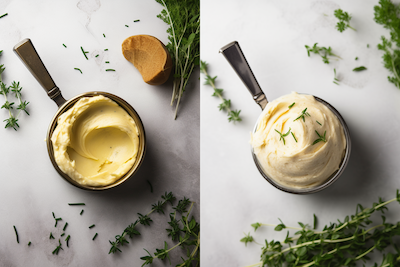Understanding Butter and Cashew Butter for PCOS Management
When managing PCOS, choosing the right fats is crucial for hormone balance and blood sugar control. Let's compare traditional butter with cashew butter, a popular plant-based alternative.
Nutritional Comparison
Per 1 tablespoon serving:
Butter:
- 102 calories
- 12g fat (7g saturated)
- 0g protein
- 0g carbohydrates
- Contains vitamins A, D, E, and K2
Cashew Butter:
- 94 calories
- 8g fat (1.6g saturated)
- 3g protein
- 4.4g carbohydrates
- Rich in magnesium, zinc, and iron
Impact on PCOS Symptoms
Cashew butter offers advantages for PCOS management due to its mineral content and lower saturated fat. The magnesium content supports insulin sensitivity, which is crucial for blood sugar management. Its zinc content aids hormone balance and supports ovulation.
Regular butter, while nutritious, contains more saturated fat which may impact insulin resistance in some women with PCOS. However, its vitamin K2 content supports hormone production and calcium absorption.
When to Choose Each Option
Choose cashew butter when:
- Following a dairy-free diet
- Looking to increase protein intake
- Need more minerals for hormone balance
- Making PCOS-friendly desserts
Choose butter when:
- Following a ketogenic diet
- Need fat-soluble vitamins
- Cooking at higher temperatures
- Making low-carb side dishes
Practical Usage Tips
Both options can fit into a PCOS-friendly diet when used mindfully. Try incorporating cashew butter into breakfast recipes or smoothies. Use grass-fed butter for cooking vegetables to enhance nutrient absorption.
Storage and Shelf Life
- Butter: 1-3 months refrigerated
- Cashew butter: 3-6 months refrigerated, stir before use
Research Methodology
Information sourced from:
- USDA FoodData Central Database
- National Institutes of Health Office of Dietary Supplements
- Journal of Clinical Endocrinology & Metabolism
Extra Tip: Try blending both! Mix softened butter with cashew butter for a spread that combines the benefits of both while reducing saturated fat content.
Frequently Asked Questions
1. Is cashew butter inflammatory for PCOS?
No, cashew butter is generally anti-inflammatory due to its healthy fats and minerals. Share this fact
2. Can I use both butter and cashew butter in my PCOS diet?
Yes, both can be part of a balanced PCOS diet when used in moderation. Share this tip
3. Does cashew butter affect insulin resistance?
Cashew butter can actually help manage insulin resistance due to its magnesium content and healthy fat profile. Share this fact
4. Is grass-fed butter better for PCOS?
Yes, grass-fed butter contains more nutrients beneficial for PCOS, including vitamin K2 and omega-3 fatty acids. Share this tip
5. How much cashew butter is safe to eat with PCOS?
Stick to 1-2 tablespoons daily to benefit from nutrients while managing calories. Share this guideline
Recommendations
1. Choose organic, raw cashew butter when possible for maximum nutrient retention
2. Opt for grass-fed butter if including dairy in your diet
3. Consider using both in rotation to benefit from their unique nutritional profiles
4. Monitor your personal response to both options and adjust accordingly
5. Store properly to maintain nutritional value and prevent rancidity
Current Research Updates
Recent studies from the Journal of Endocrinology highlight the importance of healthy fats in hormone regulation. Ongoing research at major universities is investigating the role of tree nut consumption in managing PCOS symptoms.
The National Institutes of Health continues to study the impact of different dietary fats on insulin sensitivity.
Nutritional Benefits
Cashew butter provides essential minerals like magnesium and zinc, crucial for hormone balance. Its healthy fat profile supports sustained energy levels and helps reduce inflammation.
Hormone Impact
The nutrients in both options can influence hormone production and regulation. Cashew butter's zinc content supports testosterone balance, while butter's vitamin K2 aids in hormone synthesis.
Lifestyle Integration
Incorporating these spreads into meal prep can simplify PCOS management. Try batch preparing portions for easy portion control and convenient use.
Myths and Misconceptions
Myth 1: All butter is bad for PCOS. Truth: Quality butter can provide beneficial nutrients. Share this fact
Myth 2: Cashew butter has too many carbs for PCOS. Truth: Its mineral content outweighs carb concerns. Share this fact
Myth 3: Plant-based options are always better. Truth: Both can have a place in a PCOS-friendly diet. Share this fact
Self-Assessment Quiz
Rate your current fat choices:
Join Our PCOS Community
Ready to transform your PCOS journey? Subscribe to our newsletter for exclusive PCOS-friendly recipes, latest research updates, and practical management tips. Plus, get instant access to our curated collection of hormone-balancing recipes!
🔹 Get personalized nutrition advice from our AI nutritionist
🔹 Join our supportive Telegram community
🔹 Follow us on Facebook for daily inspiration
🔹 Subscribe to our newsletter for exclusive PCOS-friendly recipes and tips

Community Comments
Community Comments
Add a comment